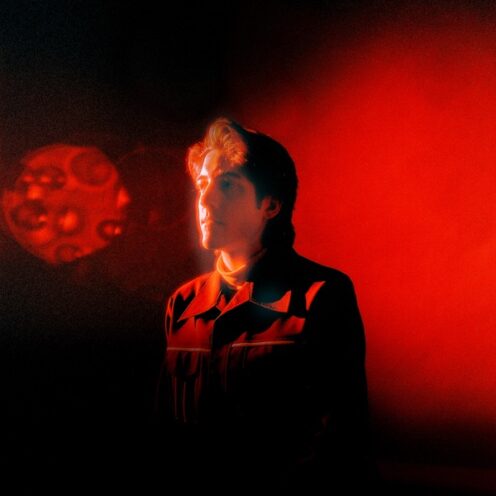
When we discuss romantic comedy films, we think about the leads, namely (for me, anyway) the self-deprecating humor of Hugh Grant and Julia Roberts’ undeniable charm and wit. Conversely, we also think of the songs that soundtrack first kisses, heartbreak, and the cheesy romantic gesture leading to our gorgeous couple’s reconciliation. Maybe it’s the heart-warming ending of The Breakfast Club, with the triumphant “(Don’t You) Forget About Me,” immediately springing to mind. Maybe you adore Love Actually and can’t help swooning over “White Flag” by Dido. Or the playing of Bill Withers’ “Ain’t No Sunshine” as Hugh Grant’s Will mourns rejecting Julia Roberts’ Anna in Notting Hill. No matter what song comes to mind for you, here’s the star whose music should feature in the next Netflix rom-com: Hala.
Hala is the moniker for Detroit-based bedroom pop artist, Ian Ruhala. On his third album and debut studio effort, Red Herring, he aims to represent “the moments in life where there is a sense of confusion to whether we’re living in a comedy or tragedy… Sometimes these feelings intermingle with each other.” Suitably apt for the times we’re living in, right? To solidify his wide-lens vision, Ruhala worked with producer Ryan Hadlock (The Lumineers, Ra Ra Riot) and strings players Andrew Joslyn (Kesha, Macklemore & Ryan Lewis) and longtime Brandi Carlile collaborator Josh Neumann. The remaining instruments on the record, including guitar, bass, piano, baritone ukulele, piano, drums, vibraphone, and xylophone, are all written and performed by Ruhala, as are all vocals.
The primary drawcard of Red Herring is that voice. Ruhala’s vocal is simultaneously sweet and playful, effortlessly leaping from jubilant to anxious to anthemic in one song. The opener, “Turn Out Right,” inspires late-night drives and a search for answers. Led by exuberant keys and guitar, “Why Do You Want Anything to Do with Me” is fluorescent in its homage to musical heroes The Clash, The Damned, and Richard Hell’s Spurts.
“Mounting felonies got you wrong/it casts a shadow now you’re gone/why can’t I serve any purpose to them?” he sings, introducing one of many saccharine melodies the album has to offer. He draws from headlines about non-violent criminal offenders, which only rose in publication after the legalization of medicinal and recreational marijuana use in the United States. Writing the song motivated Ruhala to educate himself about numerous movements, including prison reform and justice for wrongly convicted individuals. With “Why Do You Want Anything to Do with Me,” Red Herring takes a surprising turn towards social justice with its earnest critique of unreasonable, often racially charged, societal stigma.
The titular track is groovy, polished, and exists within every era and genre. Meanwhile, “Emotional R&B” aims to capture the cinematic essence of early stages in relationships. The acoustic guitar is sunny while our narrator willingly turns a blind eye to red flags, but never mind, “Emotional R&B’s got me singing all of these words to you,” before an orchestral crescendo à la “A Day in the Life.” Ruhala returns to his interpretation of romantic comedies: the life-affirming highs, the devastating lows, and all the fumbling between those moments.
Ruhala wants to create timeless music. “The guitar player in me wants to be like Stray Cats’ Brian Setzer, and like The Strokes’ Albert Hammond Jr., and Nick Valensi. There’s something to take away from any playing style,” he explains. The various influences are on show on “Somehow,” featuring the album’s only solo. It’s an epic solo, remarkably fitting in with the remainder of the track’s chilled vibe. “I’ll give you the keys to this town/Although my money is in the bank, I want to love her somehow,” he yelps. With “Somehow,” Ruhala turns to West Side Story for inspiration. “Somehow” outlines turbulent college days: “I was broke, I was about to drop out, things were not looking up for me. But I still wanted to be close with somebody, somehow.” Something tells me that those two crazy kids can make things work.
Ruhala’s vision sounds simple enough — narrate multifaceted, poignant life experiences in 12 three-minute pop songs. However, I’m thinking that it couldn’t be harder. When I think of a special romantic comedy, on film or television, I think of the art that diverts tropes. There’s no “these two seemingly hate each other but make for unquestionable sexual tension” or “men and women can’t be just friends, they have to be secretly in love” in the universes of Crazy Stupid Love or Crazy Rich Asians, two films that delicately handle characters who could have been two-dimensional in lesser scripts. With Red Herring, Ian Ruhala encourages your imagination to run wild and reinvent the coming-of-age film that’s lived in your mind all along.